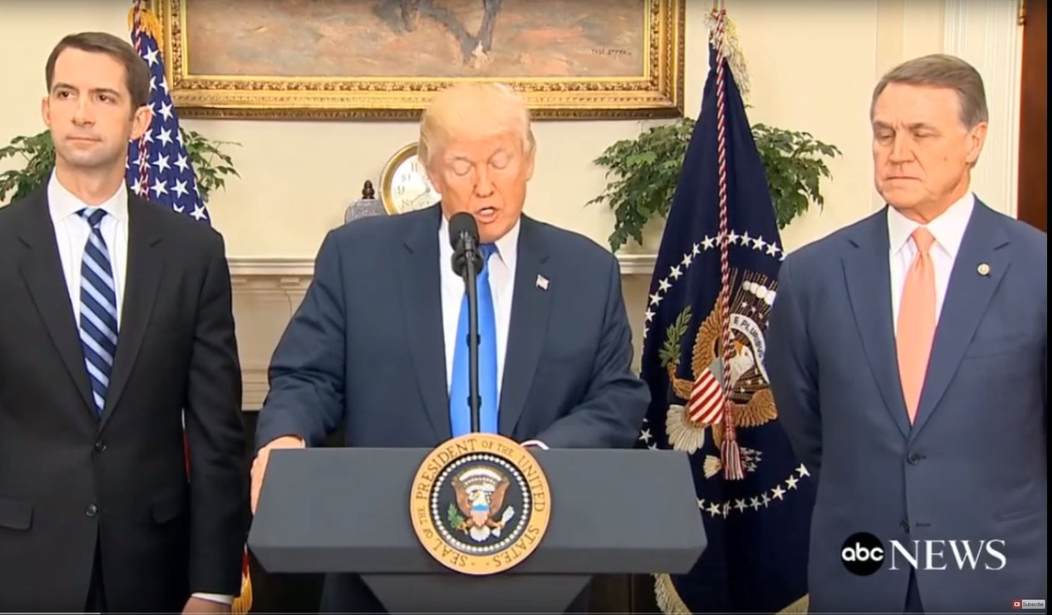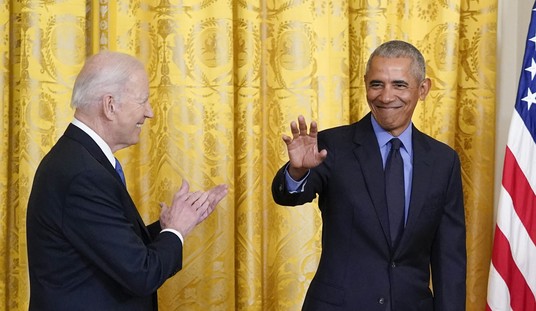A short while ago, President Trump joined Arkansas Senator Tom Cotton and Georgia Senator David Perdue in a press conference to try to get traction for their immigration bill: the RAISE Act (for Reforming American Immigration for a Strong Economy).
President Trump on Wednesday teamed up with two conservative Republican senators to roll out new legislation aimed at dramatically curbing legal immigration to the United States, a key Trump campaign promise.
Sens. Tom Cotton (R-Ark.) and David Perdue (R-Ga.) have been working with White House officials to revise and expand a bill released earlier this year that would halve the number of people who receive legal permanent residence over a decade.
The senators joined Trump at a White House ceremony to announce the measure.
The president told reporters in the Roosevelt Room that the measure “would represent the most significant reform to our immigration system in a half a century.”
They say the legislation would move the United States to a “merit-based” immigration system and away from the current model, which is largely based on family ties.
The measure reflects Trump’s rhetoric during the 2016 campaign, when he argued that the spike in legal immigration over the past several decades has taken job opportunities away from American citizens and threatened national security.
So what does the bill do?
It ends chain migration. Contrary to the propaganda by the open borders/unlimited immigration crowd, chain migration is very real. According to federal data, 70% of all green cards are handed out to relatives of a green card holder. The eligible relatives are not only spouse and children but parents, siblings and unmarried adult children. Each of these new green card holders, of course, creates a new group of people entitled to immigrate.
It cuts the allowable number of refugees to 50,000 from about 100,000.
It ends the “diversity visa” atrocity:
The Diversity Immigrant Visa Program (DV Program) makes up to 50,000 immigrant visas available annually, drawn from random selection among all entries to individuals who are from countries with low rates of immigration to the United States.
This is a list of the “diversity visa” countries.
The basic critique of the current system by Cotton and Perdue is that our immigration system is not attracting people who will help build a strong economy. Rather it is focused on marginally educated immigrants who are in need of government services and compete with low skill Americans at the bottom of the job market. Can’t say that I disagree with that at all.
This Twitter thread points out how it would actually create more support for legal immigration:
@RAVerBruggen touches on this, but it's something people on all sides could really do to understand with greater clarity.
— Lyman Expand the House Stone, AKA 石來民 (@lymanstoneky) August 2, 2017
What’s the prognosis for this? If left to the Senate, not all that good.
The legislation faces an uphill battle in the Senate, however, where it’s expected to get pushback from Democrats as well as GOP senators who oppose strict limits on legal immigration and want a broader reform effort that would address the roughly 11 million undocumented immigrants living in the U.S.
If Cotton and Perdue can get GOP leadership to bring the legislation up for a vote, supporters will need to cobble together 60 senators, including at least eight Democrats or independents, to agree to start debate on the legislation.
However, if Trump is serious about actually fighting for it then it has a chance. Trump has a powerful hole card: DACA. Many senators–like Lindsey Graham, Jeff Flake, Lisa Murkowski, and Dean Heller–are trying to find a way to save the bacon of the Dreamers. The administration has said it probably won’t defend DACA against a court challenge. Ten states, led by Texas, have said they intend to launch a legal fight to eliminate DACA. In that context, DACA becomes a powerful bargaining chip for movement on some form of the RAISE Act.













Join the conversation as a VIP Member